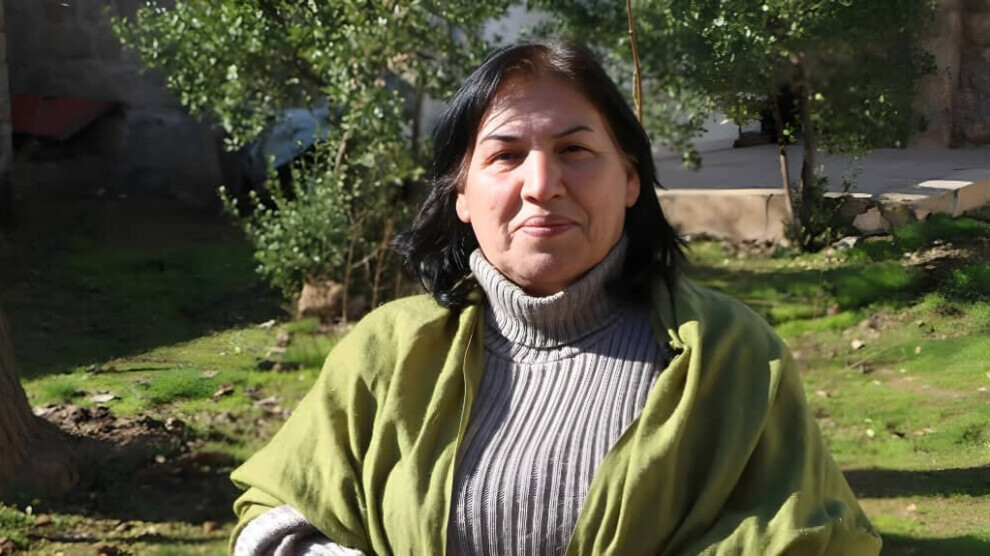Hevi Suleiman: A Symbol of Struggle for Women’s and Civil Rights
Hevi Suleiman, the coordinator of Kongra Star in Qamishlo city, carried the cause of women even in her times of pain and departed after a long life of struggle.

Serin Mohammed
Aleppo – Hevi Suleiman, coordinator of Kongra Star in Qamishlo, in the Autonomous Administration of North and East Syria, passed away on Tuesday, October 28, before fulfilling her dream of returning to her village, Mobato, in the occupied city of Afrin.
Women across North and East Syria describe Hevi Suleiman as a martyr of unbroken and unshaken struggle that lasted over 30 years. She passed away at the age of 62, leaving behind a rich legacy of women’s empowerment.
Hevi Suleiman was among the first teachers in Aleppo to teach the Kurdish language during 2010–2011. She also participated in founding the Kurdish Language Institute (SZK) and held several positions within the Democratic Autonomous Administration. As a Kurdish Alawite, she was a member of the Alawite Council in Afrin and one of the founders of the Syrian Women’s Council. Moreover, she was a member of the Founding Council of the Democratic Federation of Northern Syria and the General Council of the Democratic Union Party (PYD).
She also took part in the Committee for the Physical Freedom of Leader Abdullah Öcalan, helped establish the People’s House, and was a member of the Council of Martyrs’ Families.
Hevi contributed greatly to teaching the Kurdish language to children and instilling in them a sense of national identity. She was a model of culture, education, and resilience, with significant involvement in cultural, political, and social fields—especially in empowering women and advocating for their rights. She dedicated her life to ensuring that no woman would remain oppressed or subjugated. As stated in the Kongra Star’s official statement, Hevi Suleiman will be immortalized as a “Martyr of Kongra Star.”
Her Lasting Influence
Reyhan Alou, coordinator of Kongra Star in Aleppo, who worked with Hevi for seven years in the Shahba Canton before its occupation, said that the late activist played a major role in advancing women’s and social freedom, particularly in Afrin and Shahba. She followed the ideology and philosophy of Leader Abdullah Öcalan, whose teachings deeply influenced her personality and thinking, and she passed this knowledge on to others through training and organization.
Reyhan added, “Hevi began her organizational work in the 1990s. During that time, she met with Leader Abdullah Öcalan several times and received direct training from him. Her family was deeply committed to the Kurdish cause and sacrificed many martyrs for the liberation of the homeland.”
A Gifted Organizer and Mother
Hevi Suleiman was known for her remarkable ability to balance her responsibilities as a coordinator and as a mother of seven children. She was one of the “Mothers of Peace” in the Rojava Revolution. When the Turkish occupation forces attacked Afrin, she stood in the front lines of struggle and resistance. After being displaced from Afrin to Shahba, she was elected as the coordinator of Kongra Star for North and East Syria.
Even during the most difficult times, she encouraged people to persevere and resist. Hevi had a powerful voice and a visible impact in confronting all forms of oppression and violence against women. Her training sessions were profound and inspiring, marked by her cheerful and energetic personality. She was known for her radiant smile, her love for women, life, freedom, and nature, and for planting flowers everywhere she went.
Despite her battle with cancer, her morale remained high, and her strong will never faltered. “She always told me she would recover and return stronger to continue her struggle until her last breath,” said Reyhan Alou. “Her greatest wishes were to see Kurdistan—especially Afrin—liberated, to witness the freedom of Leader Abdullah Öcalan, and to see every woman attain her own freedom.”
A memorial ceremony for Hevi Suleiman was held at Martyrs’ Square, attended by various institutions, political and civil organizations, women’s movements, and the residents of Ashrafieh and Sheikh Maqsoud neighborhoods.
